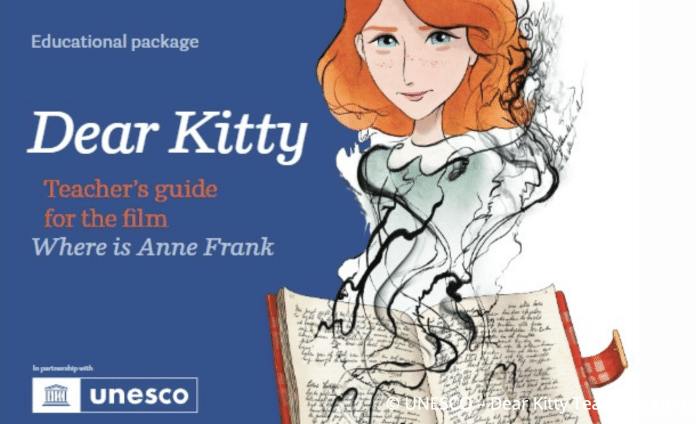On the occasion of the International Day of Commemoration in Memory of the Victims of the Holocaust, from 30 January to 1 February 2023, the UNESCO Regional Bureau for Science and Culture hosted 3 screenings of Ari Folman’s film “Where is Anne Frank”, at its premises in Venice, Italy. 337 students aged 12-18 from 5 different schools reflected on the history of the Holocaust, their hearts and minds stirred, thinking deeply about human rights.
Every year, on 27 January, UNESCO pays tribute to the memory of the victims of the Holocaust and reaffirms its unwavering commitment to counter antisemitism, racism and other forms of intolerance that may lead to group-targeted violence. The date marks the anniversary of the liberation of the Nazi Concentration and Extermination Camp of Auschwitz-Birkenau by Soviet troops on 27 January 1945.
“Keeping the memory of the Holocaust alive is the fulfilment of a universal duty, a duty to humanity, which is UNESCO’s raison d’être: uprooting hatred, building peace, and, thus, protecting humanity. On this International Day, let us commit to always remembering. We owe it to the victims of the Shoah, we owe it to the survivors, and we owe it, finally, to all the generations to come,” Director-General of UNESCO, Audrey Azoulay stated in her message on the occasion of the International Holocaust Remembrance Day.
‘Where is Anne Frank’ is a 2021 animated magic realism film directed by Israeli director Ari Folman. Largely based on the diary of Anne Frank, the film recounts the fate of the families in a secret annex in Amsterdam during the Holocaust and describes the situation in present-day Europe from the point of view of Kitty, Anne’s imaginary friend. Inscribed on UNESCO’s Memory of the World Register, Anne Frank’s diary collection remains one of the world’s most widely read books. It is also a key reference for the genocide of the Jews for audiences across the globe.
The Anne Frank House at Prinsengracht 263 in Amsterdam is where Anne Frank lived in hiding with her family for more than two years during World War II. It was there that she wrote her diary. In a reversal of the diary’s original perspective, the film’s main protagonist is Kitty, not Anne Frank, and the plot centres on her journey to finding the truth behind Anne Frank’s death back in 1945.
In this animated reimagining of history, Kitty is invisible when inside Anne Frank’s House. Morning dawns, visitors come and go but no one notices Kitty – she is unseen by them. As Anne Frank’s imaginary friend, only Anne can see her. Outside the annex, however, Anne’s imagination no longer protects Kitty; she is visible to the world of present-day Amsterdam and is witness to its modern injustices. Her movement is limited though, as she in unable to move too far away from the diary that has brought her to life. The diary is her heart, and without it, she ceases to exist.
With her diary, Anne Frank gives a voice and face to the 6 million Jews, including 1,5 million children, murdered during World War II only because they were Jewish. Produced in partnership with UNESCO, the educational package, Dear Kitty: Teacher’s guide for the film Where is Anne Frank, further educates students on the film’s plot, the history of the Holocaust, antisemitism, asylum seekers and refugees.
Through the diary, Anne Frank has become a world-wide symbol for the victims of racism, antisemitism and fascism. Her history is not only about the past, but is also history for today given that the questions Anne Frank asked herself in her diary as a teenager are still highly relevant and topical today, for adults and young people alike: “Why, oh, why can’t people live together peacefully? Why all this destruction?”. Above all, however, Anne’s dreams are what live on. Despite the difficult circumstances in which she lived and wrote, Anne Frank dared to keep dreaming. Not only about her own future, but also about a better world: more humane and just. She was convinced that everyone could contribute to this.
Ana Luiza M. Thompson-Flores, Director, welcomed the young audience with an introductory hopeful speech, noting the universality of Anne Frank’s story and its ability to connect with a worldwide audience. The film screening, as an educational experience for students, was intended to provoke thought and discussion about the history of the Holocaust and the ways in which youth can feel connected to it in the 21st Century.
Over 3 days, some 337 students from 5 different schools from Venice and nearby Mestre – Liceo Foscarini, Liceo Cavagnis, Liceo Luzzati, Barbarigo and Liceo Benedetti Tommaseo – attended the screenings at Palazzo Zorzi. The students were encouraged to formulate their own opinion about the film and recognise the terms and history of the Holocaust, with the help of the educational content of Dear Kitty – Teacher’s guide, in particular worksheets and mind maps during group discussions.
Hosting this film at our UNESCO Regional Bureau, here in Venice, was deemed an obvious choice to commemorate the International Holocaust Remembrance Day. This screening reminds us of the extent to which culture and the arts can contribute to our goals. Anne Frank is a universal story that questions our common humanity. It goes beyond the mere remembrance of Anne Frank’s life to call on us all to act, in her memory, whenever injustice or suffering is observed.

